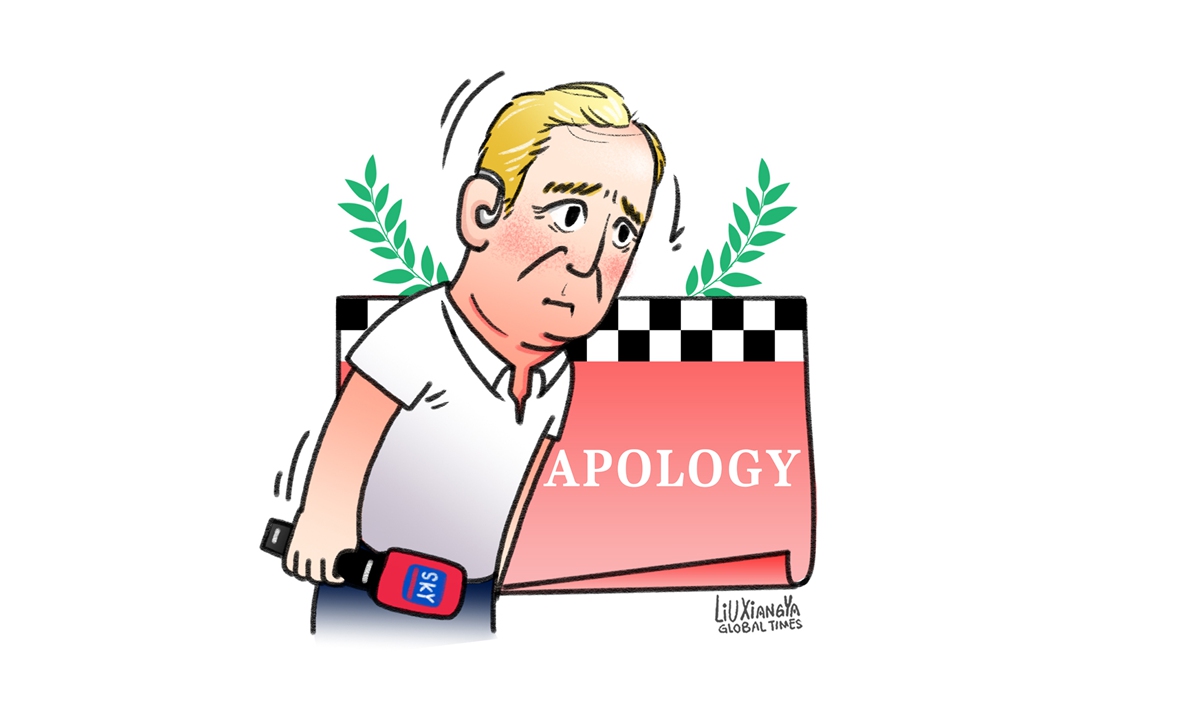
Illustration: Liu Xiangya/Global Times
Recently, a Sky Sports host used the term "Chinaman" to refer to a Chinese racer, which stirred up the anger of people in China. Although the satellite TV station later acknowledged it was "an error" and apologized online, the use of such an insulting term is something that should be discussed.
First, we should define this term correctly. According to some English dictionaries such as the Free Dictionary by Farlex, dictionary.com and definitions.net, the definition of "Chinaman" reads "Archaic or derogatory - a native or inhabitant of China." These references note that the term is "usually offensive," and that "although the term has no negative connotations in older dictionaries, and the usage of such parallel compound terms as Englishman, Frenchman and Irishman remain unobjectionable, the term Chinaman is noted as offensive by modern dictionaries."
In 2018, an article by Kimberly Yam posted on the HuffPost noted that "Chinaman" or "Chinaperson" is a "racist term," and "the term has its roots in the 19th century and was largely used to dehumanize Chinese immigrants."
In her article, Yam mentioned Republican Senate candidate Don Blankenship of the state of West Virginia, who had claimed "the term "China person' isn't racist."Yam argued "the origins of the word run counter to that sentiment."
Some Westerners may defend this term due to a misconception. For example, Blankenship argued that "I'm an American person," "some people are Korean persons, and some of them are African persons. That's not any slander there."
While they may or may not be trying to find a way to excuse their behavior, they certainly should take some more history lessons.
In Yam's article, she quoted Gay Yuen, board president of Los Angeles' Chinese American Museum, as saying, "'Chinaman' has origins in the 1860s. Chinese immigrants were drawn to the US because of the Gold Rush and ended up taking jobs on the transcontinental railroad… But white workers, who were resentful of the immigrants' skills on the railroad, often described the Chinese men as 'monkeys' or 'midgets,' according to author Stan Steiner's book Fusang, The Chinese Who Built America. As the wave of immigrants increased, so did hostility toward the Chinese, who were willing to work for lower wages and longer hours."
The article also confirmed the negative meaning of "Chinaman," saying that "though Blankenship himself may believe the term means no harm, he shouldn't ignore the long history of the term" because "this name needs to be seen in the context of the broader treatment of Chinese at that time, [who] were physically attacked and murdered, given extremely dangerous assignments and paid much less than their white counterparts."
The article also emphasized that "the person who uses the potentially derogatory term is not the one who gets to decide its appropriateness or impact. That right belongs to the person who is the object of the derision."
In this sense, the Sky Sports host's use of this term demonstrated the perpetual stereotype often attached to Chinese people.
It is a pity that this "old-fashioned" term is still in use today. Apparently, this shows some people's ignorance of history about Chinese who had made enormous contributions to the development of the West. In fact, it reveals some Westerners' deep-rooted "White-supremacist" mind-set. The Chinese people have been under imperialist oppression since 1840, and China was even called "the Sick Man of East Asia."
What is more outrageous is, even when Chinese people have stood up since the founding of the People's Republic of China in 1949 and China has become the second-largest economy in the world, some Westerners still hold prejudice against and even look down upon the Chinese people. Therefore, it is very necessary to clarify the implication of this term, and prevent such incidents from happening again as the Chinese people should be respected as they deserve it.




